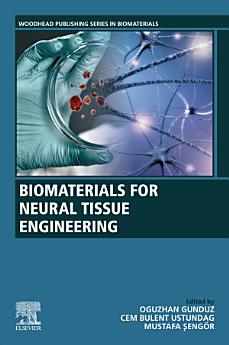Biomaterials for Neural Tissue Engineering
About this ebook
About the author
Dr. Oguzhan Gunduz is Director in Center for Nanotechnology & Biomaterials Applications and Research (NBUAM) at Marmara University. He obtained his PhD thesis in Biomaterials & Tissue Engineering at UCL under supervisor Prof. Dr. Mohan Edirisinghe in 2013. He leads an internationally high-profile multidisciplinary research group focussed on biomaterials, tissue engineering and regenerative medicine. This translational work includes the construction of artificial tissues for repairing and regenerative medicine, developing novel functional scaffolds, drug and nanomaterials therapies for soft and hard tissues, neural repair and protection, and construction of advanced 3D scaffolds with using 3D bioprinting, microfluidics, and electrospinning methods. Research is underpinned by strong productive Turkey and international collaborations resulting in number of 135 scientific papers and 6 book chapters including Elsevier and Springer publisher. He also published more than 150 conference papers.
Dr. Cem Bülent Ustundag is an Associate Professor in Bioengineering department at Yildiz Technical University. He received B.Sc. degree in Ceramic Engineering from Dumlupinar University, Turkey, in 1999, and M.Sc. in Materials Science & Engineering from Gebze Technical University in 2003 and he has dual Ph.D., in Materials Science & Engineering from Yildiz Technical University (YTU), Turkey in 2011 and Biomaterials from Tohoku University, Japan, in 2013. The research interests of Dr. Ustundag include the development of nanomaterials for biomedical applications, synthesis, and applications of graphene and carbonaceous nanomaterials, nanocomposites, hard/soft tissue scaffolds, 3D printing, and nanomaterials for environmental remediation. He has authored/coauthored over 20 research papers, 3 patents and 10 patent applications, and over 100 national and international conference papers. In addition, he is consulting with Spinamer Inc. on the development of novel biomaterials and collaborating with Biosertaech Inc., Nanortepedi Inc. generic Inc., and MITEC Inc on the nanomaterials, tissue engineering, and drug delivery systems. He is an organizing committee member of the International Congress on 3D Printing (Additive Manufacturing) Technologies and Digital Industry Congress series (2018, 2019, and 2020) and also an advisory board member of International Journal of 3D Printing Technologies and Digital Industry. Dr. Ustundag joined YTU Vocational School and promoted assistant professorship in 2005 and 2011, respectively. He held the UNIDO Technology Foresight Diploma in 2008. From 2010-2012, Dr. Ustundag served as the Head of Ceramic Program and was named the Head of Technical Programs Department (9 technical programs and over 1200 students) at YTU Vocational School and was Vice Manager of YTU Vocational School 2012-2013 and 2013-2014, respectively. Dr. Ustundag led the Establishment Commission of Faculty of Applied Science, YTU in 2013-2014. He held a visiting scholar position at the Department of Chemical and Biological Engineering, Princeton University, NJ, 2014-2015. He joined to Department of Bioengineering, YTU in April 2015. Dr. Ustundag promoted to associate professorship in Bioengineering in 2017. During BSc and MSc, Dr. Ustundag was awarded an education scholarship from Kaleseramik (The largest ceramic company of Turkey) and Ibrahim Bodur Foundation. He received RONPAKU awards of Japan Society for the Promotion of Science (JSPS) 2009. Dr. Ustundag is the recipient of the JSPS Ronpaku Medal in 2013. He was awarded the postdoctoral scholarship from TUBITAK and Princeton University in 2014.
Dr. Mustafa Sengor is an Assistant Professor at Marmara University, Istanbul Turkey. He graduated from the Mechanical Engineering Department of Boğaziçi University in 2010, and completed his master’s degree program at Boğaziçi University in 2013. He received the title of Doctor in 2019 with his thesis titled "Core – Shell Pva / Gelatin Nanofibrous Scaffolds Using Multinozzle Aqueous Electrospinning". He continued to his studies on biomaterials, hydrogels, electrospinning, nanotechnology, and three-dimensional writing technology. He has been studying in medical device research and development. Currently, he is an Assistant Professor in Marmara University and working in Nanotechnology and Biomaterials Application and Research Center (NBUAM) as Deputy Director.




